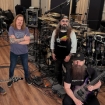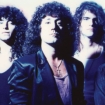When you've existed as a band for over three decades, sometimes you need to shake up the creative process a little bit. So when it came time to write what would become Distance Over Time, Dream Theater's fourteenth studio album, the New York prog-metal mainstays tried something they'd never done before: Getting it together in the country.
"I actually have to thank my wife for that idea," says guitarist and co-founder John Petrucci. "A couple of months before we were due to start writing, she suggested it: 'Why don't you guys go away to a remote area, and kind of do a retreat? You've never done something like that.' I thought that sounded awesome, so I texted the guys, and they were all immediately on board."
Petrucci, vocalist James LaBrie, keyboardist Jordan Rudess, bassist John Myung, and drummer Mike Mangini wound up spending four months together at Yonderbarn, a secluded residential studio located in New York's Catskills mountains, first writing and then recording the ten songs that make up Distance Over Time. "As much time as we've spent together on the road, it's not the same as actually living together, enjoying every meal, and hanging out," Petrucci explains. "It's a different kind of guy-bonding thing. Everybody was really invested in what we were doing; nobody had to be anywhere, so we were able to have these long, really productive days."
The renewed creative fire that resulted is clearly audible in tracks like "Untethered Angel," "Barstool Warrior" and "At Wit's End," which not only hit harder than the band has in years, but also convey the same sense of epic majesty heard on classic albums by such progressive forebears as Yes, Genesis and Rush. "All of us are so nerdy like that," Petrucci laughs, when Revolver mentions those bands. "We all are pretty much the same age, and we all had the same life-changing experiences listening to those records. We definitely infused some of that, subconsciously, into the record."
HOW DID YOU DECIDE TO WORK AT YONDERBARN?
We're all from the east coast, so I immediately thought of going somewhere with mountains, lakes, that kind of camping thing. It took a while to find the right place, though, because we were not really looking for a studio, but more for a space where we could live in, be loud, and set up all our gear in. Yonderbarn, when we found it, couldn't have been more perfect; I couldn't even believe that it existed! It was basically an empty studio with a house on the property. Originally, the fact that there was no gear in there was just what we wanted, because we weren't looking to record the album — we just wanted the space to set up, play and write.
SO YOU WEREN'T ORIGINALLY PLANNING TO RECORD THE ALBUM UP THERE?
No, the original plan was to track somewhere in the city. Once we wrote the album there, and crudely demoed the songs we wrote as we wrote them — I use the word "crudely," because they were all live performances, but the demos all sounded really good — the environment felt and sounded so good that we decided to stay there. Once we made that decision, we had to bring in gear! Dream Theater actually owns a lot of recording gear, and we started a relationship with Rupert Neve Designs, who loaned us and sold us a bunch of stuff. Our recording engineer [James Meslin] actually brought in his desk, because he happened to be moving — he just took it out of his house and brought it up [Laughs]. We just kind of built the place back into a recording studio, which was pretty crazy.
THERE'S A LONG TRADITION OF ARTISTS RECORDING IN THE CATSKILLS — THE BAND, BOB DYLAN, VAN MORRISON, TODD RUNDGREN — BUT IT'S NOT AN AREA GENERALLY ASSOCIATED WITH PROGRESSIVE METAL, PER SE.
Right! [Laughs] It's not like this is a unique idea at all — bands do this all the time, going away and staying somewhere — but you're right, Woodstock and upstate New York, it's a big hippie area. Doesn't seem like prog-metal really goes with it, but it didn't really matter; we just kind of made the music we made. But it definitely made everyone feel relaxed and comfortable.
SO YOU HAD SOME TIME TO KICK BACK AND ENJOY THE PEACE AND QUIET WHEN YOU WEREN'T WRITING, PLAYING OR RECORDING?
Exactly. It was really cool. And it was summertime, so the weather couldn't have been nicer. I brought up one of my smokers, so we had barbecues. We were visited by a lot of wildlife, because you're in the mountains there, and there was one day where bears came up to the house, which was pretty interesting! We had some garbage outside the door, and I guess they were interested in that. But they came right up to the door, a mother and her cub. I thought it was kind of ironic, because the place was originally built by Ryuichi Sakamoto, and he scored The Revenant, which has that famous bear attack scene. Maybe the bear was trying to tell us something! [Laughs] Up 'til that point, it had mostly been deer and badgers and foxes; but after that, when we'd leave the studio and it would be really late, we'd be scared shitless. Matty, my guitar tech, he had his van outside, and he would turn it on remotely, honk the horn and turn the lights on, to make sure there were no bears as we walked the hundred feet from the barn to the house. [Laughs]
YOU BROUGHT YOUR OWN SMOKER? I'M GUESSING YOU'RE A BIT OF A CULINARY WHIZ…
Well, I actually got turned onto the whole smoking thing by Sterling Ball, who owns Ernie Ball/Music Man, and is also an award-winning barbecue pit master. He sent all his artists smokers many years ago, and I got into it. So it's another nice thing besides guitars that Sterling and I have in common. So I brought up a drum smoker, and we had a regular barbecue, a Weber, as well. It's like with any other group of guys — as soon as the barbecue is going, five guys are around the grill, and everybody's telling you that you're doing it wrong. One day I decided to make steaks. I just wanted them to sit there on the grill and not be moved, and then I spotted Mangini touching them with a prong. I go running out, "Hey, dude, what are you doing? Stay away from my steaks!" And he's like, "You really gotta turn 'em, man!" That whole guy-barbecue thing really comes out. [Laughs] But it was great; we had some really nice food.
THE MUSICAL DIRECTION OF THE ALBUM IS HEAVIER AND TIGHTER THAN ON YOUR LAST RECORD. WAS THAT JUST THE RESULT OF ROCKING OUT TOGETHER IN THE SAME ROOM?
Mostly, yeah. We definitely talked about wanting to write a more concise record — the last one [2016's The Astonishing] was two hours and fifteen minutes long — and we wanted to write something that was more raw and heavy and organic. But I think it's also just that, when all the gear is set up in a big, great-sounding room, and the guitars are cranked up loud and the drums are live, you don't gravitate towards soft-sounding music, you know what I mean? [Laughs] So you just sort of gravitate towards big riffs, strong grooves, and that kind of stuff just comes out. The first song that we wrote was "Wit's End," and that just sort of set the stage for the rest of it; it was like, "This is going to be something really special!"
DID MOST OF THE SONGS COME TOGETHER PRETTY QUICKLY?
Very quickly, yeah. Basically, within the first month we were there, we had all the music written. Which isn't unusual in the case of any Dream Theater record; once we're all together, and we're in a really good place, as far as everyone feeling relaxed and comfortable and creative, a song can take anywhere from a day to two-to-three to write.
WERE THERE ANY SONGS THAT TOOK A LITTLE LONGER TO WORK OUT?
One song, "Paralyzed," we'd done our live demo of it, and something about wasn't sitting quite right with me. I kind of thought about it overnight, woke up and I had this idea of making a bunch of changes, so we went in and redid a lot of it. And there are certain songs that are more technically involved, that just take more craft — a song like "Pale Blue Dot," which has a big, big instrumental section, that took a lot more sit-down time to work out the technical intricacies. But it really depends on the song. "Out of Reach," which is the only ballad on the album… we didn't anticipate writing a ballad, but it just happened very naturally one morning. I started playing something on the guitar, Jordan joined in, and we just improvised this piece together. And when we were done, we kind of looked at each other like, "We should record that!"
DO IDEAS OFTEN COME TO YOU IN YOUR SLEEP?
They do, yeah. Especially being immersed like that — the music never stops. At the house we were living in, you'd always hear music coming from another room. Like, Jordan always had his iPad or some keyboard out, and he'd be working on something when everybody was sleeping. And you'd wake up the next morning, and immediately see another band member, and the conversation starts about that riff from last night. So yeah, a lot of times while I'm laying in bed, lyrical ideas will start coming, riff ideas ... Even after a full day in the studio, going back to the house with a glass of wine, we'd start to talk about a certain section, and we'd pull out an iPhone and hum a section into it. So yeah, it was just this sort of non-stop creative mode that we were in. It was really, really cool.
DO YOU THINK YOU GUYS WILL WANT TO TAKE THE SAME TACK FOR THE NEXT ALBUM?
You know, I can't see any reason why we wouldn't. Everything about it was absolutely perfect. It was fun, it was so conducive to creativity, and I think we made a record that we can all be very proud of. So why not do it that way again? We joked about just staying up there a little longer and writing the next one, because we got into this groove where, every two days or so, we had a new song. We were like, "We could just make this our full-time gig — we'll just live up here, write a song every couple of days, and we'll have fifteen more albums!" [Laughs]
YOUR WIFE, RENA SANDS, HAS ALSO HAD A LONG CAREER IN MUSIC, AND SHE CURRENTLY PLAYS GUITAR IN JUDAS PRIESTESS, AN ALL-FEMALE TRIBUTE TO JUDAS PRIEST. WHAT'S IT LIKE HAVING TWO SHREDDERS IN THE SAME FAMILY?
It's great. There's a lot of guitars in our house, a lot of amps in every room, and at any given time, a lot of guitar music being played. We've been married 25 years — we met originally at a music convention — and we've since had three kids together who are now grown and in the arts themselves; so their whole lives, there's always been music in the house. I love it, and I love having the ability to come back and play music for my family, play stuff for Rena and get her opinion. She's amazing, and she's an incredible guitar player, and it's great having music be such a strong part of our relationship. There's a lot of support for each other. Like I said, it was her idea for us to make the record this way — "It would be great for you guys to bond and do a musical retreat." I thought that was really insightful, for her to know we needed that as a band.








